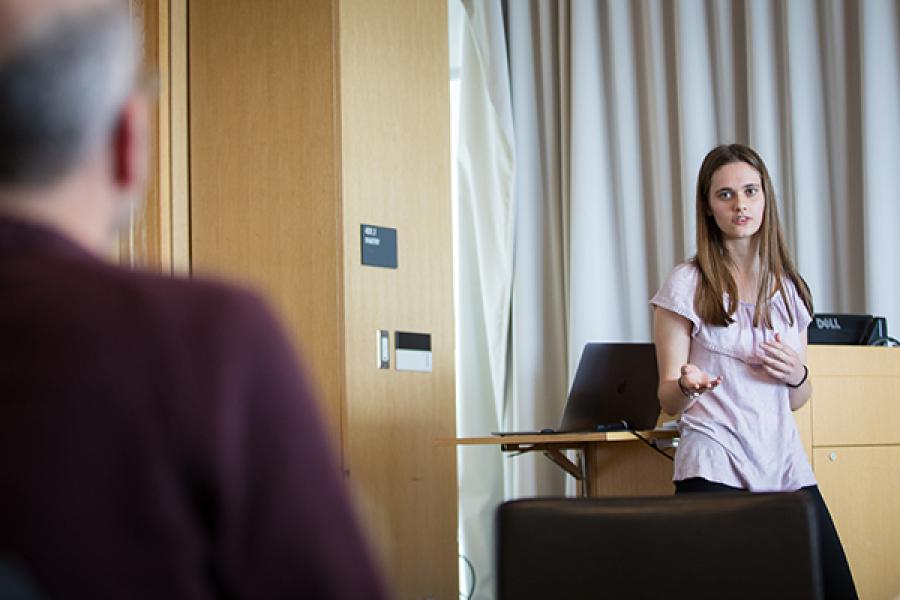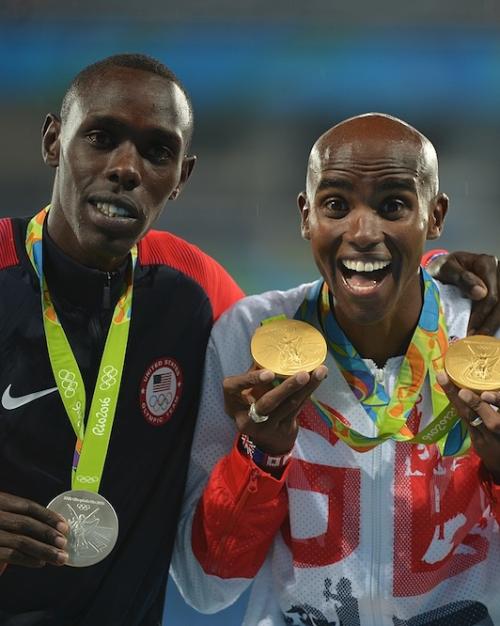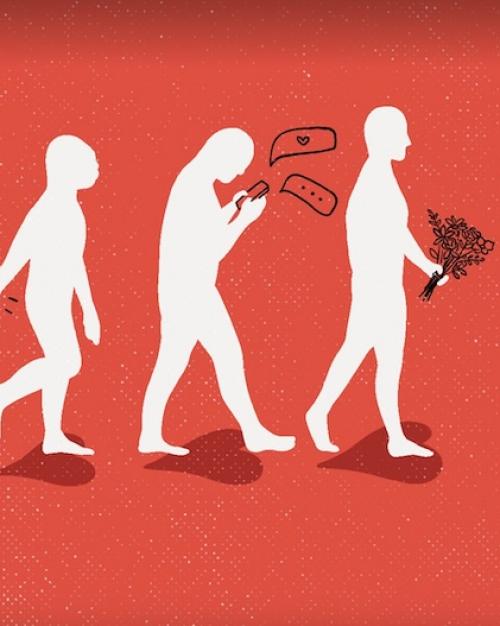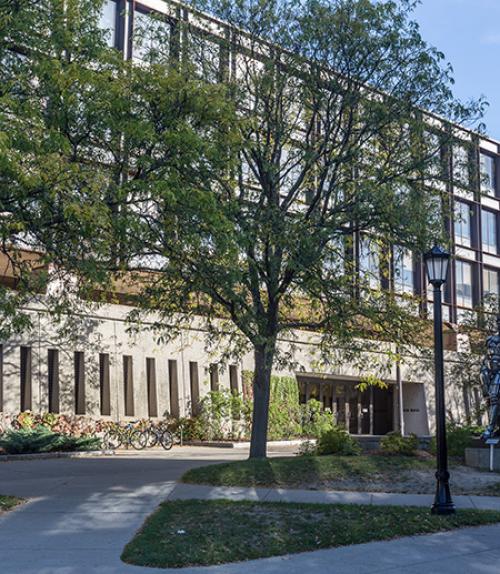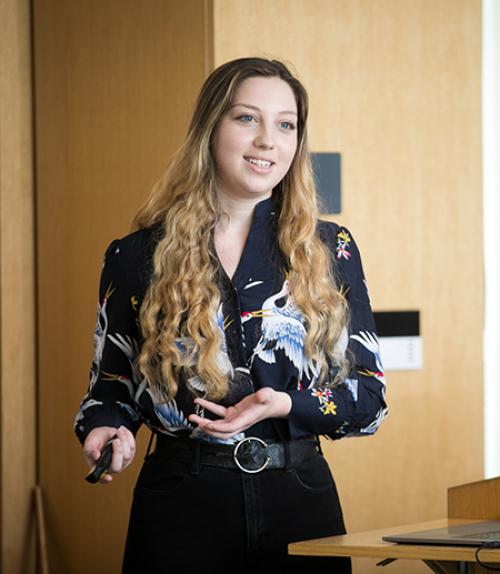One of the true treasures of the college experience is the freedom to follow your curiosity and see where it takes you. In no major is this more encouraged than for College Scholars in the College of Arts & Sciences, who, as sophomores, propose a project that combines their varied interests and craft their college curriculum to follow those pathways.
For the 14 seniors graduating this year from the College Scholar Program, those interests have included topics such as artificial intelligence, juror decision making and the Early Ming tributary system. They shared their research at a May 4 event in the Physical Sciences Building.
“These students have successfully taken ownership of their intellectual development,” said Michael Goldstein, a professor in psychology and the director of the College Scholar Program. “They worked for years on their innovative, multidisciplinary projects, and I’m really proud of them.”
Claire Liu ‘19 was always interested in misinformation and political persuasion, but her decision to study the phenomenon of “fake news” arose after the 2016 election. Her research delved into how misinformation has evolved over time, how people define fake news and how they determine which sources are reliable. She is majoring in government, as well as being a College Scholar.
Although she took many courses in government, information science and communication, Liu said “a big part of my undergraduate career in Arts & Sciences was actually studying French. I've loved all of my coursework in the French department with Professor Damien Tissot. Damien would help me think about questions surrounding misinformation and propaganda in a really insightful, cross-cultural context.”
While studying abroad, Liu said she also took classes on political polls and opinion influence in French society that were impactful on the way she reflected on her research topic.
James Slater Goodman ‘19 studied the Australian Magazine, “Bulletin,” and the role it played in constructing an Australian identity in the late 19th century. His work combined his interests in literature and history and allowed him to explore topics like literary ecology and hyperlocal journalism.
“I always knew I wanted to study history and literature, but wasn’t sure how I would approach that within the existing majors,” he said. His project allowed him to think about the two views idea of nationalism he saw growing up – how nationalistic rhetoric was used to justify political and military action after 9/11 and, alternatively, how the patriotism of the Olympic games inspired him as a swimmer. And he chose to use the lens of Australia to view nationalism because of the year he spent in that country after graduating from high school and before coming to Cornell.
“My original idea was to explore representations, legacies, and contemporary impacts of Australian outlaws, called bushrangers,” he said. “It’s been a continual process of exploration, ideation, re-exploration, and re-ideation.”
Darby Tarlow ‘19 focused her College Scholar project on artificial intelligence, studying how people perceive the social and mental qualities of artificial agents compared to real human beings.
"The College Scholar Program has provided a good way for me to think about what academia is meant to do and how my individual research fits into a department and can cross departments," she said.
Other graduating College Scholars and their projects include:
- Rachel Novick - Does the Dollar Fit the Damage? Influences of Attorney Guidance and Numeracy on Juror Decision Making
- Samuel Barnett - American Imperium, Transnational Jihadism, and International Normative Change
- Josh Sadinsky - Sonic Meditations: The Aural Poetics of Music and Field Recordings
- Griffin Smith-Nichols - The Heliand: Shaping the Saxon Vision of Christ
- Sean Cronan - The World of the Early Ming Tributary System, 1368-1435
- Abigail Chen - Contesting Favorability in Cambodia and Myanmar: Perceptions of U.S. and Chinese Influence and Implications for Public Diplomacy
- Marlene Berke - Perceptual Reality Monitoring
- Elle Rothermich - Who Lives, Who Dies, Who Tells Your Story? A Theory of Narrative Politics
- Drew Musto - A Case for a Federal Britain
- Jesse Sanchez - Race, Space, and Place at Cornell
Sterling Williams-Ceci ’21 thinks the public is under-informed about the amount of personal data available online, much of which is out of their control, so her project focuses on this issue. She expects to find demographic differences concerning attitudes toward big data, with members of underprivileged and minority groups especially concerned about the presence of online data due to various sociological factors (such as racism and classism).
“I have always had a knack for online investigation,” she said. “In high school, I would get requests from teachers to find information about their families and friends online. This led me to come across some pieces of information that were highly personal, but freely available online. This made me start to ponder the ethics of this Big Data age, and its effects on people.”
To illustrate her work during the May 10 event, Williams-Ceci asked Goldstein if she could see what she could uncover about him.
“Professor Goldstein didn't think I would be able to find much online, since he grew up before the advent of the Internet,” she said. “He also only gave me a few data points to start with, but with just a few hours of searching, I was able to find biographical details (his birthday, political affiliation, home address, spouse's name, etc.), along with pictures of him and his siblings in high school. I also found pictures of his mother in the 1950s and today, and census records of both his parents from 1940. Old newspaper clippings revealed an unclaimed property notice from 2012 and a public lecture he gave about fracking.”
Williams-Ceci hopes her project will “democratize knowledge by educating everyone about Big Data's influence in our lives.” She also hopes to understand how “big data” has impacted different groups of people in different ways.
The College Scholar Program is for exceptional students who want to conduct an individualized, interdisciplinary program of study and research. Students apply in the first semester of their sophomore year and work closely with an advisor to select courses that prepare them for their independent research projects and also expose them to the disciplines and methods essential to a liberal arts education.
They also take a seminar during their spring of their sophomore year that focuses on Cornell resources, research methods, proposal writing, and presentation skills. At the end of each semester, students submit an updated project description and course plan to their advisors.
“The program is focused on a small group of stellar students whose interests transcend disciplinary boundaries,” Goldstein said. “A traditional major is too restrictive for them. They wish to connect ideas and fields of research that are currently siloed away from each other. I really enjoy helping them develop their ideas and watching them grow as independent thinkers.”

